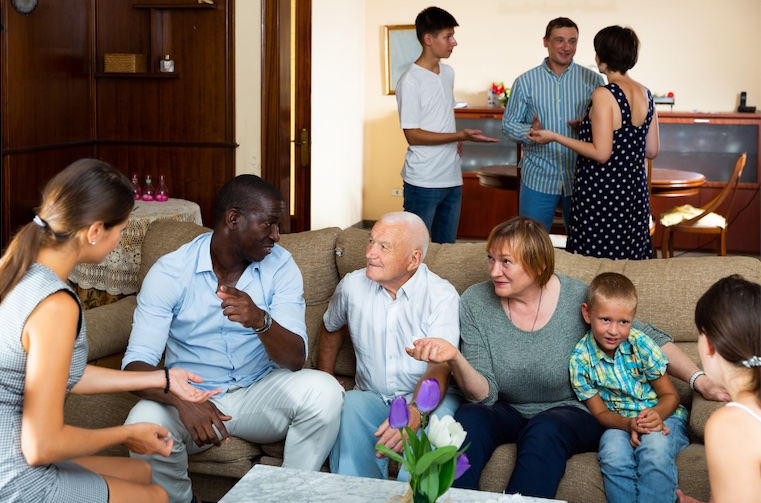Diet Talk: Why it’s harmful and How to handle it
February 22, 2022
Fad diets and weight loss unfortunately, are a common topic of conversation. But have you ever paused to think about how diet talk and comments made about may impact your child?
This article will go into exactly what’s considered diet talk, how it might affect your child, a loved one or even you, and how we can turn the conversation around.

Picture it….. it’s your daughter’s birthday and your extended family is about to come over to celebrate. You prepared all her favorite foods and made her favorite cake.
Your family arrives and you made a beautiful spread of appetizers to enjoy. Then your daughter’s aunt says, “Oh I can’t eat that spinach dip, it’s too many points.” or “Those mini pizza bagels are going to throw off my carb intake.” or “I’ve been good all week so today is my cheat day.”
Does this sound familiar? How often do you hear these types of comments at gatherings? I’m going to go out on a limb here and say, probably pretty frequently.
What is diet talk?
To start, let’s get clear what’s considered “diet talk.” According to the University of British Columbia, “Diet talk includes using language around or engaging in conversation about restricting food or certain nutrients (eg. carbohydrates, fats) or excessive exercise in order to achieve a certain body type or image.”
Examples of diet talk would be
- I can’t have bread, I don’t eat carbs.
- I have no self control when it comes to chips.
- I’m having a cheat day.
- Are you going to eat all that?
- You look like you lost weight.
- You’re so lucky you’re young, you can eat whatever you want.
All of those statements listed are examples of diet talk and there are hundreds more but you get the idea. Maybe you’re thinking so why is it so harmful to talk about diets?
The Affect of Diet Talk.
Diet talk labels food as good and bad, for example kale is good and cake is bad. When you eat something that is labeled or considered “bad” then you inherently start to feel guilty for eating something you shouldn’t have.
Now maybe you’re not on any sort of meal plan or fad diet, you just eat when you feel hungry. Maybe you’re trying to have a healthier relationship with food by eating more mindfully and intuitively. Hearing those examples listed about diet talk may cause you to feel guilty, maybe a little shameful and just downright awful about yourself.
If hearing comments about diets and food have the potential to make you feel lousy, I invite you to pause and put yourself in the shoes of a 10 year old or a 15 year old.
How a child might interpret diet talk?
- If my aunt isn’t eating the bread, it must be bad for me. I shouldn’t eat it.
- I’m hungry but maybe I shouldn’t eat all the food on my plate.
- I thought cheating was bad, why are we cheating when we eat food.
- Maybe I need to lose weight too.
Hearing comments about dieting may influence your child to feel differently about themselves and about food. No one, no matter how old you are should harbor feelings of guilt, shame and/or fear around food and about themselves.
This week, of Feb 21, 2022 is National Eating Disorder Awareness Week. Disordered eating patterns amongst teens and adolescents have been on the rise since the start of the pandemic. While there are various reasons a disordered eating behavior may start, diet talk is one of them.
Diet talk may influence the following eating behaviors in children and teens
- Restriction of certain foods and amounts may occur.
- A fear of certain foods may start to develop.
- Sneak eating may occur of foods they think are “bad” for them.
- They may start to become insecure about their body and think negatively about themselves.
If you feel your child may be exhibiting signs of disordered eating behavior consult a professional such as a registered dietitian or your pediatric primary care physician. To learn more about my services click here.
How to handle diet talk.
Next time you’re at a gathering or enjoying time with friends and diet talk starts to come up, it might seem tricky to navigate the conversation but here are some tips on how you can steer the conversation in a different direction.
Conversation changers:
- If you don’t mind, I’d prefer not to talk about diets. Tell me what you think about the new season of ….(insert name of tv show)
- If you don’t mind, all food is delicious and enjoyable in our house so let’s skip the diet talk today. You’re such a good friend, I appreciate you supporting me in this.

To conclude, having a better understanding on what diet talk is and why it’s harmful, puts you in the driver’s seat and helps you handle the diet talk around you. It is possible to have a healthy relationship with food. Food is meant to be enjoyed, it provides us with nourishing energy.
I work with families, adolescents and teens to overcome these challenges around food and help them to feel empowered. It is possible to love food and enjoy eating without harmful diet talk!
To learn more on how I can help you or someone you love, please schedule a time to talk.
And to download a PDF file of this article click here.
Marissa Perrotta is a registered dietitian and registered yoga teacher specializing in family nutrition and helping families and moms have a healthy relationship with food.